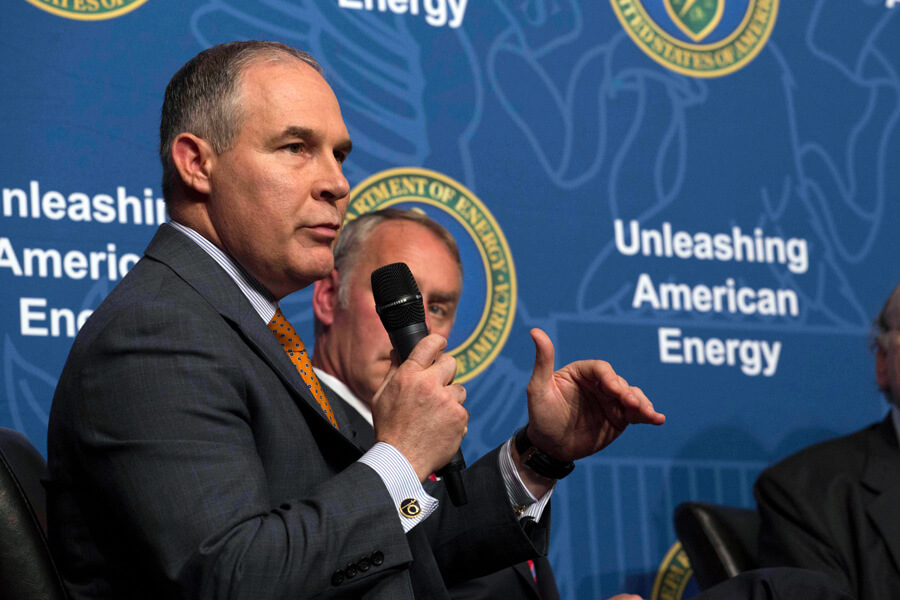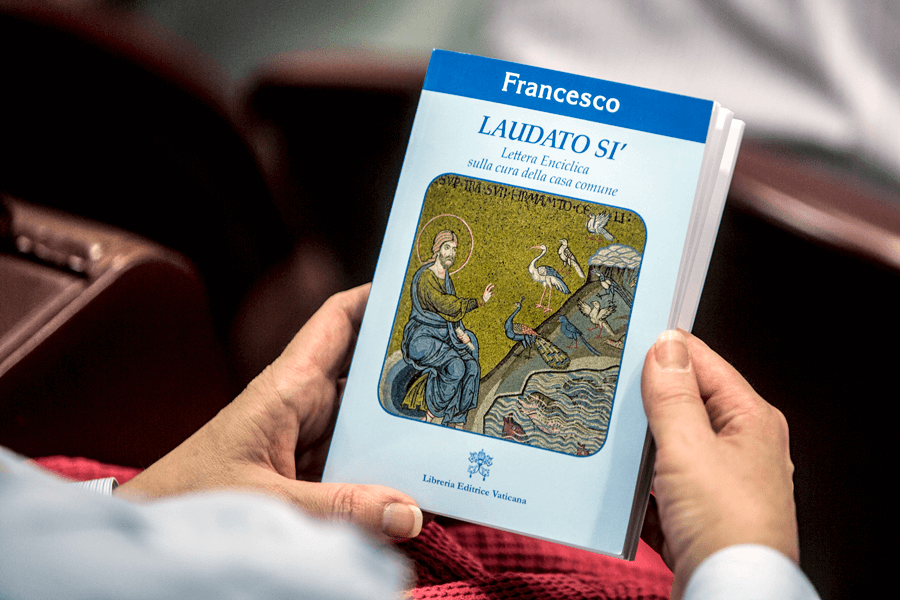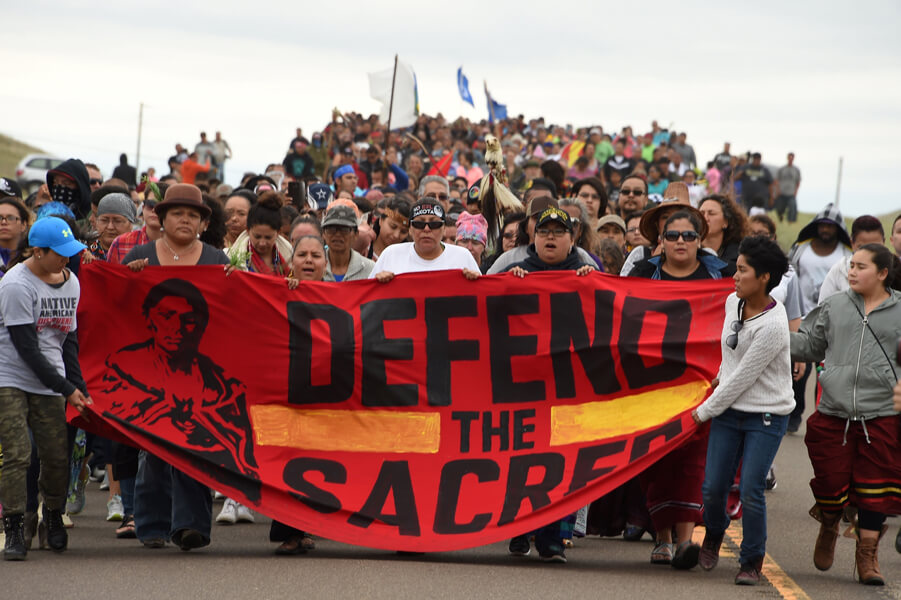“We are the belongings of the world, not its owners,” wrote writer and environmentalist Wendell Berry in 1969. Whether or not you agree might depend, in part, on your religion.
More than 80 percent of Americans view themselves as religious, spiritual or both, and 84 percent of the global population identifies as part of a religious group. These alliances can profoundly affect how we view the world and our place in it — including our attitudes toward climate change and what humanity’s response should be.
Religion can mean a lot of things. It can refer to a body of official teachings (for example, Catholic Christianity or Vajrayana Buddhism), it can refer to shared cultural practices and worldviews (for example, Indigenous traditions or consumer capitalism), or it can simply refer to feelings of connection to something greater than oneself. But no matter how it’s defined, it informs individuals’ views on how to steward the Earth, share space with other species and react to climate change, says Willis Jenkins, a religious studies scholar at the University of Virginia.
Without understanding such entanglements with religion, he says, there’s no hope of understanding climate change’s cultural dimensions.
Jenkins, with co-authors Evan Berry of American University and Luke Beck Kreider of the University of Virginia, described how religion influences views on climate change in the 2018 Annual Review of Environment and Resources. He spoke with Knowable Magazine about the biblical idea of dominion, “petro-Islam” and indigenous views of Earth stewardship. This discussion has been edited for length and clarity.
How does religion help us interpret our responsibility as stewards of the Earth?
Stewardship is an idea with a particular influence in the Abrahamic religions: Judaism, Christianity, Islam. It’s the sense that we, whoever “we” are, have been entrusted with the responsibility for something that really belongs to another. Earth is not exactly our property, then; it’s something that we have to take care of and that we’re responsible for, to some transcendent authority — God, in these religions, but stewardship might also be used in a sense that we’re responsible to the nation or to future generations.
The idea of stewardship is criticized for being anthropocentric, for having a strong, distinct role of humans: The human is a steward in a way that all the other creatures are not. And that seems to risk endorsing strong interventions — for example, climate engineering or exploitation of resources. But stewardship does not necessarily lend itself to domination or exploitation.
Some have interpreted a biblical reference known as the “dominion mandate” to mean that people should extract as many resources from the Earth as possible. A famous example is Scott Pruitt, former head of the Environmental Protection Agency, who has said that people have a responsibility to “harvest the natural resources.” Can you explain the dominion mandate?
The idea that humans have a mandate to dominion arises from the first pages of the Hebrew scriptures and their creation narratives. There’s a verse in which humans are told to subdue the Earth, fill it and have dominion. I’ll say that this is followed very quickly by a second creation story, the Eden story, including Adam and Eve. It’s a completely separate story of beginnings, with different Hebrew vocabulary than what appears in Genesis 1. In the second story, humans are to tend and guard the Earth, whereas in Genesis 1, they are to subdue and have dominion over it.
It is generally held that the two stories were written by different communities at different times.
So right off the bat there’s this internal debate — but nonetheless, there’s certainly a scriptural warrant to the idea that humans have dominion. Then the big question is: What does dominion mean?

Former Environmental Protection Agency head Scott Pruitt speaks at an energy roundtable in Washington, DC, in 2017. Pruitt has interpreted the biblical concept of the “dominion mandate” to mean that humankind has a responsibility to harvest the Earth’s natural resources.
CREDIT: DOE PHOTO / ALAMY STOCK PHOTO
Climate change is an interesting religious case because it is an example where debate over the meaning of a scriptural concept is happening in real time. Some evangelicals think that a dominion mandate should lead toward increasing fossil-fuel energy. Other evangelicals think that it means humans need to take responsibility for fossil-fuel use and maybe draw down.
Research shows that white evangelicals in the United States are more likely to be climate sceptics than people of other religious affiliations. They may cite dominion to explain their position. In their interpretation, global climate governance would impede free exploitation of natural resources and, by slowing economic growth, worsen prospects for human welfare. That view does not seem to be based in credible social science, but the point is that they appeal to dominion to symbolize the importance of human dignity.
In contrast, non-white evangelicals in the US, and evangelicals in other countries, have a much lower correlation between their religious affiliation and climate scepticism. The difference suggests that what we are seeing is not simply a structure of religious belief shaping a particular climate policy. Rather, religious beliefs and political context feed back on one another.
Why do these different groups of evangelicals interpret dominion differently?
It is not irrelevant that white evangelicals in the United States are affiliated with fossil-fuel production in a way that other evangelicals are not. There’s evidence that white US evangelical Christianity is becoming a kind of faction in and of itself. I think this will create an increasing problem for global evangelicalism, which will have to decide whether this faction still belongs to their wider family.
There’s an important global evangelical statement from 2011 that says climate change is a grave moral problem of our time. So evangelicals around the world may come to look at this denialist faction as a kind of odd faction. US evangelicals just take up all the space because they are incredibly politically powerful.
Some researchers see this division explained more by religious identity while others see it explained more by political identity. White evangelicals in the United States tend to identify as Republican and have followed the Republican Party’s hardening opposition to climate policy. Which factor is more significant, and how do they interact? That’s the subject of ongoing research.
Religious/spiritual self-identity in the US is shifting over time, as shown in a 2017 a Pew Research Center survey comparing 2017 with earlier results. You can see how these results break down according to gender, age, race and education at the Pew center’s website.
Besides white evangelical Christianity, how do some of the other religions interpret dominion?
For any religious community that has a view of a strong, unique role for humans in managing the Earth, one possible variant of that is that there’s a mandate to extract. But religious voices within those Abrahamic faiths will often say that extractivist dominion is not a legitimate religious world view, but a kind of secular distortion of it — the disfiguring of religion and abandoning of real responsibility.
Pope Francis’ Climate Encyclical, Laudato si’, focuses on how to interpret dominion, what it has meant and what it should mean. His view of dominion is basically that it is contemplative, that it is about understanding the meaning of other creatures. Francis rejects the idea that God wants humans to exploit natural resources without limit. That is profoundly different from the idea that dominion means that property-owners have a mandate to take material resources from the Earth to support projects of wealth-building, which is an idea that really caught on during the Enlightenment and industrial modernity.
Some of the dynamics that I’ve mentioned already about the fault lines within religions, like evangelical Christianity, certainly hold true in other religious contexts. Buddhist interpretations of climate change in the world’s greatest carbon emitter — China — are different from the way Buddhism interprets climate change in nearby Bhutan, which is a carbon-negative country.
In Bhutan, policies that favor conservation over economic growth are more likely to be construed as in line with classical Buddhism, whereas in China, economic growth is prioritized. That’s an oversimplification, because Bhutanese Buddhism derives from a different school than most Buddhism in China, where it also mixes with Daoism and Confucianism.
But the basic pattern holds: China’s carbon-intensive energy regime creates an incentive to interpret Buddhist teachings as supporting the state’s moderate climate policies, while Bhutan’s conservation-focused energy regime creates an incentive to interpret Buddhist teachings as supporting the state’s more robust climate policies.

Pope Francis’ encyclical letter Laudato Si’, published in 2015 and with the subtitle sulla cura della casa comune (on care for our common home), addressed global warming and environmental degradation and called on the world to take unified action.
CREDIT: ALESSANDRA BENEDETTI / CORBIS VIA GETTY IMAGES
Islam is widely different across different contexts. Saudi Arabia’s oil-fueled geopolitical power has caused its version of Islam to massively influence the shape of global Islam. Some even —pejoratively — call its Wahhabism “petro-Islam.”
But Islam is also an important part of the religious background of places where people are already climate-vulnerable. Especially in Indonesia, there are a number of Islamic-formed climate movements. Bangladesh, a majority-Muslim country, does not have oil resources and is one of the most climate-vulnerable countries. So that creates a strong incentive in Bangladesh to view Islam as supporting climate justice.
What are some notable actions that religions have taken in addressing climate change and the environment?
The World Council of Churches has had climate change as an official program focus since before there was an Intergovernmental Panel on Climate Change (IPCC). Obviously, the Pope’s encyclical, Laudato si’, is a very visible intervention into global climate discourse. It was interesting to read the way that Laudato si’ was concerned that solutionism, when it comes to climate change — for example, geoengineering and carbon offsets — will likely reinforce the power of the elite over the poor, and more broadly, humanity over the Earth.
The Islamic Declaration on Climate Change is also an important global statement that was made in advance of the Paris Conference of the Parties in 2015, and it makes a pan-Islamic case for specific, robust climate policies. Key leaders of that initiative are located outside the oil-producing countries, although they have worked to create connections across the fossil divides.
I think it’s important to mention the networks of indigenous peoples. We chose to include them in our article because the political and climate discourse of indigenous peoples routinely refers to inherited cosmovisions, such as collective rights to traditional lands, waters and sacred sites and the rights of Earth and autonomy of nature.
That’s a distinctive aspect of how they engage with climate change. Examples connecting the spiritual to the environmental include the Lakota ceremonies at Standing Rock in opposition to the Dakota Access Pipeline and Pachamama (Mother Earth) politics in South America. So even though indigenous peoples around the world have really different cultural and religious inheritances from one another, they forge common political alliances based on traditions of Earth’s sacredness.

Native Americans protest the construction of the Dakota Access Pipeline in 2016. The pipeline, which became operational in 2017 and transports oil from North Dakota to Illinois, passes close to the reservation of the Standing Rock Sioux, who with others protested the route due to disturbance of sacred burial grounds and to environmental concerns.
CREDIT: ROBYN BECK / AFP / GETTY IMAGES
In coming years, do you think religion will make it easier or more difficult to address climate change?
I’ll say this: It’s encouraging that leaders from so many recognized religious communities are speaking out about climate change. It’s encouraging that so much informal spirituality and so many new religious expressions are environment-related. There’s a real cultural hunger for nature-based spiritualities to recover and restore and heal these connections between people and the Earth. All of that is encouraging for cultural repair of broken ecological relations.
Two centuries from now, I wonder if historians of religion will trace back to this time the first fissures that led to major reorganization of religious affiliation. For example, it seems possible that, if the white evangelicals in the United States continue along their current trajectory, they will come to be regarded by future historians as an ethno-nationalist breakaway from global evangelicalism.
It also seems possible that, if many indigenous peoples continue to articulate a nature-focused political view in response to climate change, future historians will regard the climate crisis as a key contributor to an indigenous renaissance.
And insofar as climate change makes secular people question the pursuits of their lives, the stories they live by, the purposes of capitalism, etc. — then climate change may be experienced by them as religious in depth.




